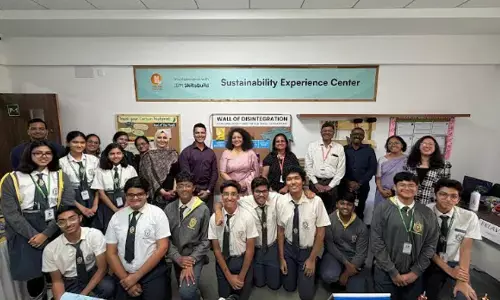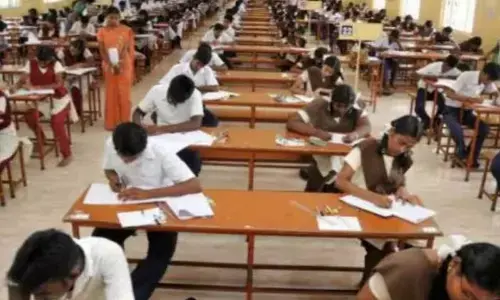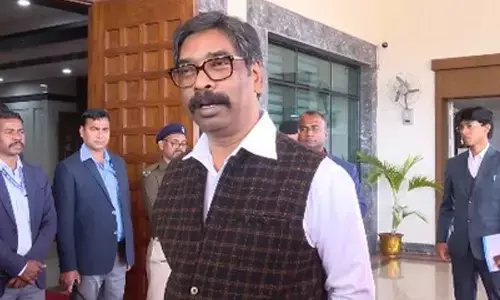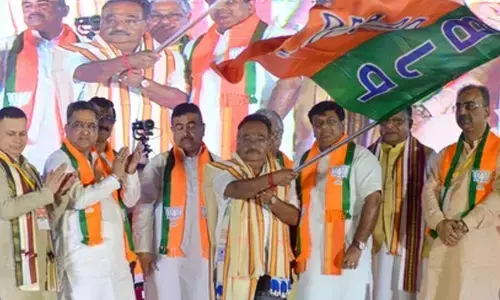Behavioural practices and Covid-19 in Telangana

Behavioural practices and Covid-19 in Telangana
Coping with Covid-19 is a very new experience for everyone across the world and the people of Telangana who largely stay in rural areas are no exception
Coping with Covid-19 is a very new experience for everyone across the world and the people of Telangana who largely stay in rural areas are no exception. In the absence of a vaccine yet, the only safeguard mechanism available to protect their lives against Covid-19 is to practise "Physical Distancing". This is amply demonstrated in the definition laid out by the World Health Organization (WHO) guidelines which clearly indicates that physical distancing means "maintain at least one meter distance between yourself and others; Avoid going to crowded places".
The other important preventive measure is hand washing at regular intervals. In this context, it should be understood that such protocols indicated by the WHO to combat the virus would be difficult to practise for those households living within congested, over-crowded housing as well as those using shared basic amenities.
As per the report on "Drinking Water, Sanitation, Hygiene and Housing Condition in India" by Government of India 2019 based on National Sample Survey (NSS) 76th round information, the average number of living rooms available at the household level is 1.89 and more than one third of the of houses (33.7 per cent of the total cases) do not have separate room for the married couples. So they share physical space with the rest of the family. An analysis of the same report on hand-washing practices reveals that around three fourths of the population (73.2 per cent at the state and 61.3 per cent in rural) wash their hands using soap and water after defecation. This share is lower than the national figure (74.1 per cent at all India level and 66.8 per cent in rural areas).
However except for Kerala (87.8 per cent at the state and 82.8 per cent in rural), all other southern states have proportions less than Telangana – (Karnataka – 69.2 per cent at the state and 57.4 per cent of rural; Andhra Pradesh – 54.0 per cent at the state and 44.3 per cent of rural; Tamil Nadu – 46.3 per cent at the state and 30.7 per cent of rural). So far as washing hands with water and soap/detergent before having a meal is concerned, in Telangana, only 39.9 per cent complies with the practice (28.9 per cent in the rural areas and 52.4 per cent for urban areas).
Within this proportion, a large proportion (59.2 per cent) uses only water to wash hands before meals (70.1 per cent in rural and 46.7 per cent in urban). At the national level, the share of population that washes hand with soap/detergent in rural is 25.3 per cent while the same stood at 56.0 per cent in urban areas (35.8 per cent at national level). Among the southern states, the share is highest in Kerala (53.8 per cent at the state and 51.6 per cent in rural) and lowest in Tamil Nadu (27.3 per cent at the state and 13.2 per cent in rural).
The habit of frequent hand-washing is completely dependent upon the availability of running water in houses. An analysis of the same report based on NSS 76th round information reveals that 58.2 per cent of urban households and 35.3 per cent of rural households in Telangana have access to tap water in the house or within their residential premises. It should be noted in this context that the status of Telangana is better in comparison with other southern states (except Karnataka) and India.
However, the rest of the households are dependent upon the facilities - public taps, tube wells and hand pumps - situated outside the premises of the dwelling units. Of the total households, around 12 per cent (19.8 per cent in the rural areas) fetch their water from public taps in Telangana. It should be kept in mind that these households struggle a lot to fetch their water from the public taps because its availability is restricted to a particular time and within that stipulated time period one has to make arrangements for storing water for as per his/her requirements. One can always see a large crowd within the vicinity of the tap.
Given the fact that the place involves a congregation which stands in close proximity within the vicinity of the public tap, the physical distancing guidelines to combat the Covid-19 virus would be difficult to implement. This clearly indicates that while frequent washing of hands as mandated in Covid prevention measures is in itself a difficult task, there is a possibility of spread of infection during public health crises given the lack of proper drinking water facilities.
The availability of bathrooms and toilets exclusively for households is an important aspect which can prevent the rapid spread of the virus. Around 78 per cent of households have access to exclusive bathrooms and 73.2 per cent have access to exclusive latrines in Telangana. Households with no bathrooms are 8.5 per cent in Telangana (14.7 per cent in rural areas) whereas the same is 12.7 per cent for latrines (22.5 per cent in rural areas).The accessibility to bathrooms for common use is 13.9 per cent (higher in urban areas with 21.6 per cent) whereas the same is 14.0 per cent for latrines (higher in urban areas with 21.3 per cent).
Physical distancing norms which are very crucial to prevent the spread of virus are extremely difficult to comply with given the state of housing and sanitation facilities. Thus, the major challenge to combat the virus lies in the behavioural practices of the majority of the population in the state. There have been ample efforts made by the government to disseminate information about preventive measures regarding combating Covid-19, but the above mentioned indicators are becoming a constraint in achieving the desired objectives.
The author is Professor (Economics), Council for Social Development, Hyderabad










